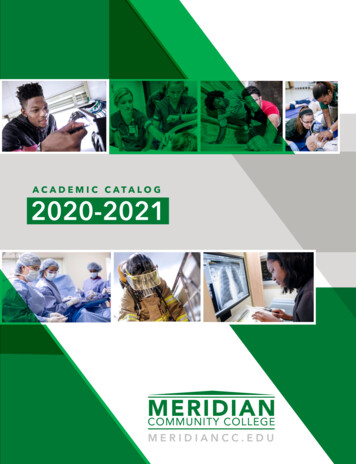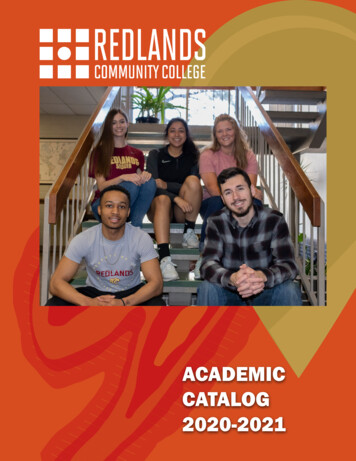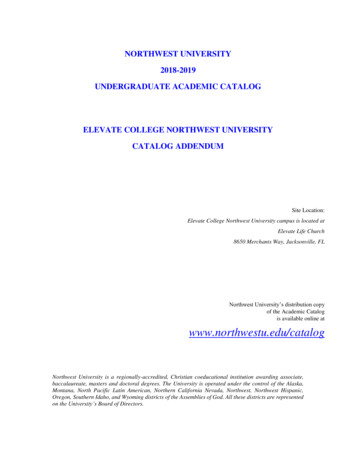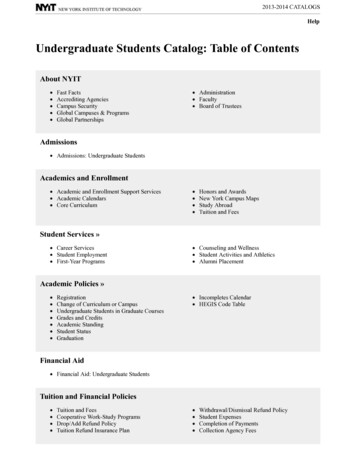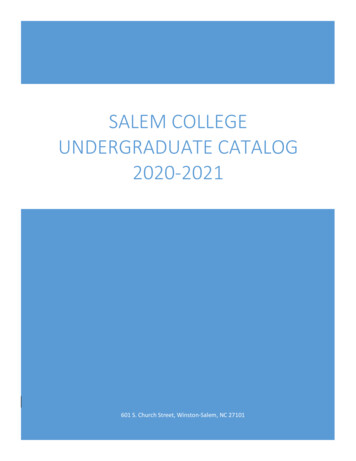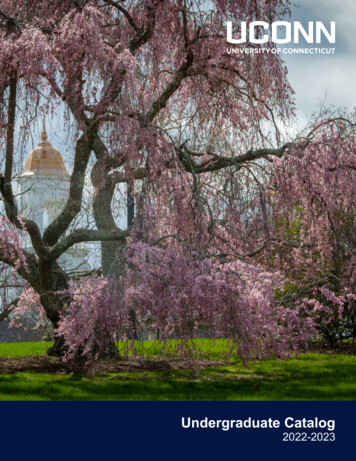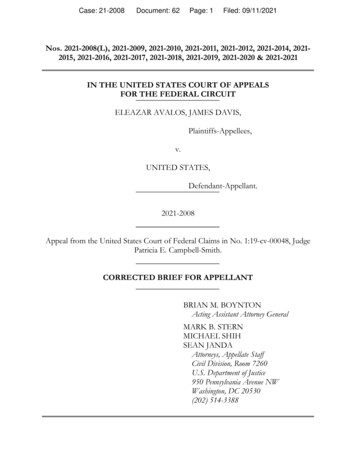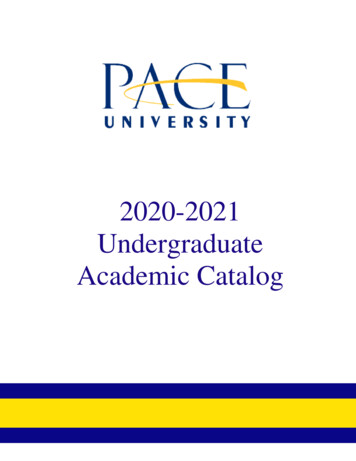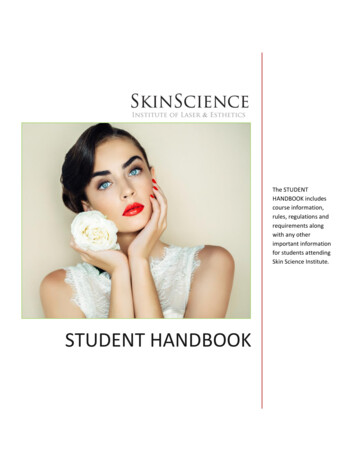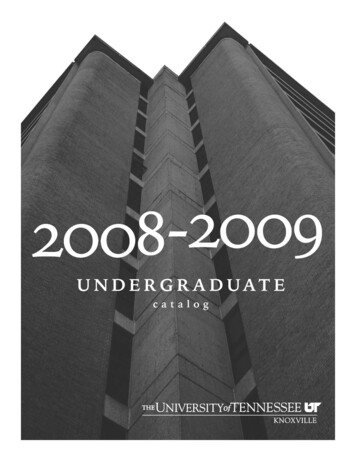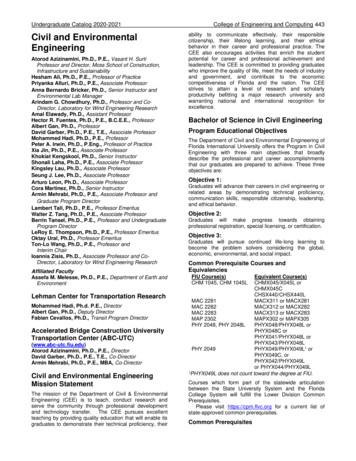
Transcription
Undergraduate Catalog 2020-2021Civil and EnvironmentalEngineeringAtorod Azizinamini, Ph.D., P.E., Vasant H. SurtiProfessor and Director, Moss School of Construction,Infrastructure and SustainabilityHesham Ali, Ph.D., P.E., Professor of PracticePriyanka Alluri, Ph.D., P.E., Associate ProfessorAnna Bernardo Bricker, Ph.D., Senior Instructor andEnvironmental Lab ManagerArindam G. Chowdhury, Ph.D., Professor and CoDirector, Laboratory for Wind Engineering ResearchAmal Elawady, Ph.D., Assistant ProfessorHector R. Fuentes, Ph.D., P.E., B.C.E.E., ProfessorAlbert Gan, Ph.D., ProfessorDavid Garber, Ph.D., P.E., T.E., Associate ProfessorMohammed Hadi, Ph.D., P.E., ProfessorPeter A. Irwin, Ph.D., P.Eng., Professor of PracticeXia Jin, Ph.D., P.E., Associate ProfessorKhokiat Kengskool, Ph.D., Senior InstructorShonali Laha, Ph.D., P.E., Associate ProfessorKingsley Lau, Ph.D., Associate ProfessorSeung J. Lee, Ph.D., Associate ProfessorArturo Leon, Ph.D., Associate ProfessorCora Martinez, Ph.D., Senior InstructorArmin Mehrabi, Ph.D., P.E., Associate Professor andGraduate Program DirectorLambert Tall, Ph.D., P.E., Professor EmeritusWalter Z. Tang, Ph.D., P.E., Associate ProfessorBerrin Tansel, Ph.D., P.E., Professor and UndergraduateProgram DirectorLeRoy E. Thompson, Ph.D., P.E., Professor EmeritusOktay Ural, Ph.D., Professor EmeritusTon-Lo Wang, Ph.D., P.E., Professor andInterim ChairIoannis Zisis, Ph.D., Associate Professor and CoDirector, Laboratory for Wind Engineering ResearchAffiliated FacultyAssefa M. Melesse, Ph.D., P.E., Department of Earth andEnvironmentLehman Center for Transportation ResearchMohammed Hadi, Ph.d. P.E., DirectorAlbert Gan, Ph.D., Deputy DirectorFabian Cevallos, Ph.D., Transit Program DirectorAccelerated Bridge Construction UniversityTransportation Center (ABC-UTC)(www.abc-utc.fiu.edu)Atorod Azizinamini, Ph.D., P.E., DirectorDavid Garber, Ph.D., P.E., T.E., Co-DirectorArmin Mehrabi, Ph.D., P.E., MBA, Co-DirectorCivil and Environmental EngineeringMission StatementThe mission of the Department of Civil & EnvironmentalEngineering (CEE) is to teach, conduct research andserve the community through professional developmentand technology transfer. The CEE pursues excellentteaching by providing quality education that will enable itsgraduates to demonstrate their technical proficiency, theirCollege of Engineering and Computing 443ability to communicate effectively, their responsiblecitizenship, their lifelong learning, and their ethicalbehavior in their career and professional practice. TheCEE also encourages activities that enrich the studentpotential for career and professional achievement andleadership. The CEE is committed to providing graduateswho improve the quality of life, meet the needs of industryand government, and contribute to the economiccompetitiveness of Florida and the nation. The CEEstrives to attain a level of research and scholarlyproductivity befitting a major research university andwarranting national and international recognition forexcellence.Bachelor of Science in Civil EngineeringProgram Educational ObjectivesThe Department of Civil and Environmental Engineering ofFlorida International University offers the Program in CivilEngineering with three main objectives that broadlydescribe the professional and career accomplishmentsthat our graduates are prepared to achieve. These threeobjectives are:Objective 1:Graduates will advance their careers in civil engineering orrelated areas by demonstrating technical proficiency,communication skills, responsible citizenship, leadership,and ethical behavior.Objective 2:Graduates will make progress towards obtainingprofessional registration, special licensing, or certification.Objective 3:Graduates will pursue continued life-long learning tobecome the problem solvers considering the global,economic, environmental, and social impact.Common Prerequisite Courses andEquivalenciesFIU Course(s)CHM 1045, CHM 1045LEquivalent Course(s)CHMX045/X045L orCHMX045CCHSX440/CHSX440LMAC 2281MACX311 or MACX281MAC 2282MACX312 or MACX282MAC 2283MACX313 or MACX283MAP 2302MAPX302 or MAPX305PHY 2048, PHY 2048LPHYX048/PHYX048L orPHYX048C orPHYX041/PHYX048L orPHYX043/PHYX048LPHY 2049PHYX049/PHYX049L¹ orPHYX049C, orPHYX042/PHYX049Lor PHYX044/PHYX049L¹PHYX049L does not count toward the degree at FIU.Courses which form part of the statewide articulationbetween the State University System and the FloridaCollege System will fulfill the Lower Division CommonPrerequisites.Please visit https://cpm.flvc.org for a current list ofstate-approved common prerequisites.Common Prerequisites
444 College of Engineering and ComputingCHM 1045CHM 1045LMAC 2281MAC 2282MAC 2283MAP 2302PHY 2048PHY 2048LPHY 2049General Chemistry IGeneral Chemistry Lab ICalculus I for EngineeringCalculus II for EngineeringCalculus III for EngineeringDifferential EquationsPhysics with CalculusGeneral Physics Lab IPhysics with Calculus IIAdditional lower-division courses required for thedegree:CHM 1046General Chemistry IICHM 1046LGeneral Chemistry Lab IIGLY 1010Physical GeologyGLY 1010LPhysical Geology LabEGN 1110CEngineering DrawingDegree Program Hours: Minimum 128The Civil Engineering curriculum provides a program ofinterrelated technical areas of Civil Engineering with theirfundamental core subjects of the engineering program.The technical interdisciplinary courses are in the areas ofconstruction, geotechnical, environmental, cesengineering.Civil engineers play an essential role in serving peopleand the environmental needs of society. These needsrelate to shelter, mobility, water, air and development ofland and physical facilities.The academic program is designed to meet the Stateof Florida’s articulation policy as well as to satisfy criteriaoutlined by the Accreditation Board for Engineering andTechnology (ABET), among others.Lower Division PreparationStudents admitted to the university are admitted directly totheir chosen major. Students are expected to make goodprogress based on critical indicators, such as GPA inspecific courses or credits earned. In cases wherestudents are not making good progress, a change of majormay be required. Advisors work to redirect students tomore appropriate majors when critical indicators are notmet.Lower division preparation includes completion of preengineering courses which include Engineering Drawingwith CAD application, Calculus I, II, & III, DifferentialEquations, Chemistry I & II and Labs, Physics I withCalculus and Lab, Physics II with Calculus, and PhysicalGeology and Lab, all with a grade of ‘C’ or better. See theexample semester by semester program in the followingpages.Effective pursuit of engineering studies requires carefulattention to both the sequence and the type of coursestaken. It is therefore important, and the college requires,that each student plan a curriculum with the departmentalfaculty advisor.All students must comply with the University CoreCurriculum Requirements for the University for SocialScience, Humanities, Arts and English. The departmentrequires a minimum of 15 semester hours in the area ofHumanities, Arts and Social Science. All transfer studentsshould refer to the Undergraduate Education section ofthis catalog to determine if they have met therequirements for Humanities, Social Science, Arts, andEnglish at their previous institution.Undergraduate Catalog 2020-2021A minimum grade of ‘C’ is required in all writing,physics, chemistry, and mathematics courses.A minimum grade of ‘C’ is required of all CivilEngineering courses and prerequisite courses.Students who have been dismissed for the first timefrom the University due to low grades may appeal to theDean for reinstatement. A second dismissal will result inno possibility of reinstatement.Other RequirementsStudents must have a minimum 2.0 GPA, must completeall required classes, and must otherwise meet all of thestate and university requirements in order to graduate.Students who enter the university with fewer than 60transferred credits must take 9 summer credits. Refer tothe appropriate sections in the Catalog’s for moreinformation.Courses are to be taken in the proper sequence. Anycourse taken without the required prerequisites andcorequisites will be dropped automatically before the endof the term, resulting in a ‘DR’ or ‘DF’.Upper Division Course ObjectivesThe program of study encourages the development of abroadly educated civil engineering graduate, who cansucceed as a productive engineer with continuedprofessional growth. The courses listed as requirementsfor the BS degree not only provide the students withmathematical and scientific knowledge, but also includeother essential areas necessary for a successfulengineering career. The courses have been designed toincrease student competence in written and oralcommunication skills as well as to develop critical thinkingand creative problem solving strategies. Course projectsare designed to teach engineering science fundamentalsand their applications while providing enrichingopportunities for laboratory and computer-basedexperiences. Furthermore, students are supplied with anunderstanding of the economic, social, ethical andprofessional responsibilities of engineers in our societyand are encouraged to include sustainable development inall project designs.Foreign Language RequirementStudents must meet the University Foreign LanguageRequirement. Refer to the appropriate sections in theCatalog’s General Information for Admission andRegistration and Records.Upper Division ProgramThe basic upper division requirements for the BSCEdegree are as follows:Applied Mathematics (3)STA 3033Intro to Probability and StatisticsorEIN 3235Evaluation of Engineering DataEngineering Sciences (17)CGN 2420Computer Tools for EngineersCWR 3201Fluid MechanicsCWR 3201LFluid Mechanics LaboratoryEGM 3520Engineering Mechanics of MaterialsEGM 3520LMaterials Testing LabEGN 3311StaticsEGN 3321Dynamics333313133
Undergraduate Catalog 2020-2021College of Engineering and Computing 445General Engineering Courses (5)CGN 2161Career Orientation in Civil Engineering 1EGS 2030Ethics and Legal Aspects in Engineering 1EGN 3613Engineering Economy3Civil Engineering Curriculum (42)CCE 4031Project Planning for CECEG 4011Geotechnical Engineering ICEG 4011LGeotechnical Testing LaboratoryCES 3100Structural AnalysisCES 4702Reinforced Concrete DesignCGN 4802Civil Engineering Senior Design ProjectCWR 3540Water Resources EngineeringENV 3001Introduction to EnvironmentalEngineering – GLENV 3001LEnvironmental Laboratory ISUR 2101CSurveyingTTE 4201Transportation and Traffic EngineeringCGN 4980Civil Engineering SeminarC.E. Elective(min)C.E. Elective(min)C.E. Elective(min)C.E. Elective(min)3313333313313333Note: Students may be eligible to select some graduatelevel civil engineering technical electives as approved bythe instructor and the undergraduate advisor.Professional Graduation RequirementCivil Engineering students must take and pass CGN 4980(FE Seminar). Students showing evidence of passing thestate FE (EIT) examination will have this requirementwaived.Civil Engineering ProgramStudents may have a different sequence of courses asarranged with their advisor. For complete programinformation, students should refer to the ProgramSummary Sheet available at the Department.First Semester: (16)MAC 2281Calculus I for EngineeringCHM 1045General Chemistry ICHM 1045LGeneral Chemistry I LabENC 1101Writing and Rhetoric IGLY 1010Physical GeologyGLY 1010LPhysical Geology LabSLS 1501Freshman Experience4313311Second Semester: (13)MAC 2282Calculus II for EngineeringENC 1102Writing and Rhetoric IIPHY 2048Physics with CalculusPHY 2048LGeneral Physics Lab ICGN 2161Career Orientation in Civil Engineering43411Third Semester: (14)UCC Humanities Group 1MAC 2283Calculus III for EngineeringCHM 1046General Chemistry IICHM 1046LGeneral Chemistry Lab IIUCC Social Science Group 134313Fourth Semester: (16)PHY 2049Physics with Calculus IIMAP 2302Differential EquationsEGN 1110CEngineering DrawingUCC Arts4333UCC Humanities Group 23Fifth Semester: (13)EGN 3311Statics3SUR 2101CSurveying3CGN 2420Computer Tools for Engineers3EGS 2030Ethics and Legal Aspects in Engineering 1UCC Social Science Group 23Sixth Semester: (13)STA 3033Introduction to Probability and Statisticsfor CSorEIN 3235Evaluation of Engineering DataEGN 3321DynamicsEGM 3520Engineering Mechanics of MaterialsEGM 3520LEngineering Mechanics of Material LabEGN 3613Engineering EconomySeventh Semester: (14)CWR 3201Fluid MechanicsCWR 3201LFluid Mechanics LabCES 3100Structural AnalysisENV 3001Introduction to EnvironmentalEngineering – GLENV 3001LEnvironmental Laboratory ITTE 4201Transportation & Traffic Engineering333313313313Eighth Semester: (16)CEG 4011Geotechnical Engineering ICEG 4011LSoil Testing LaboratoryCWR 3540Water ResourcesCES 4702Reinforced Concrete DesignCE ElectiveCE Elective313333Ninth Semester: (13)CCE 4031Project Planning for Civil EngineersCGN 4802Civil Engineering Senior Design ProjectCGN 4980Civil Engineering SeminarCE ElectiveCE Elective33133Suggested Electives for Structural EngineeringOption**CES 3580Hurricane Engineering and GlobalSustainability – GLCES 4320Intro to the Design of Highway BridgesCES 4605Steel DesignCES 4711Introduction to Prestressed ConcreteStructuresCGN 4011Computational Techniques andVisualization for Civil EngineeringApplicationsCGN 4510Sustainable Building EngineeringCES 5106Advanced Structural AnalysisEGM 5421Structural Dynamics33333333Suggested Electives for Water Resources EngineeringOption**CWR 4204Hydraulic Engineering3CWR 4530Modeling Applications in WaterResources Engineering3CWR 4620CEcohydrological Engineering3CWR 5235Open Channel Hydraulics3ENV 4401Water Supply Engineering3Suggested Electives for Geotechnical EngineeringOption**CEG 4012Geotechnical Engineering II3
446 College of Engineering and ComputingCEG 4126CEG 5065CES 3580CGN 4011Fundamentals of Pavement DesignGeotechnical DynamicsHurricane Engineering and GlobalSustainability – GLComputational Techniques andVisualization for Civil EngineeringApplicationsSuggested Electives for Environmental EngineeringOption**ENV 4005LEnvironmental Laboratory IIENV 4024Bioremediation EngineeringENV 4101Fundamentals of Air PollutionEngineeringENV 4330Hazardous Waste Site AssessmentENV 4351Solid and Hazardous WasteManagementENV 4401Water Supply EngineeringENV 4513Chemistry for Environmental EngineersENV 4551Wastewater Treatment EngineeringENV 4560Reactor DesignSuggested Electives for Construction EngineeringOption**CCE 4001Heavy ConstructionCES 3580Hurricane Engineering and GlobalSustainability – GLCGN 4510Sustainable Building EngineeringCGN 4930Special Topics in Civil EngineeringCCE 5035Construction Engineering ManagementCCE 5036Adv Project Planning for Civil EngineersSuggested Electives for Transportation EngineeringOption**CEG 4126Fundamentals of Pavement DesignCGN 4321GIS Applications in Civil &Environmental EngineeringTTE 4102Urban Transportation PlanningTTE 4202Traffic EngineeringTTE 4203Highway Capacity AnalysisTTE 4804Geometric Design of HighwaysUndergraduate Catalog 2020-202133331333333333331-433333333**All recommended and other technical electives must beapproved by the advisor and must concentrate on relevantapplications of civil engineering design. Selection of aproper sequence would allow the student to specializewithin a focus area of interest (e.g., structural,geotechnical, construction, water, environmental, ortransportation).Bachelor of Science in EnvironmentalEngineeringProgram Educational ObjectivesThe Department of Civil and Environmental Engineering ofFlorida International University offers the Program inEnvironmental Engineering with three main objectives ishments that our graduates are prepared toachieve. These three objectives are:Objective 1:Graduates will advance their careers in environmentalengineering or related areas by demonstrating technicalproficiency, communication skills, responsible citizenship,leadership, and ethical behavior.Objective 2:Graduates will make progress towards obtainingprofessional registration, special licensing, or certification.Objective 3:Graduates will pursue continued life-long learning tobecome the problem solvers considering the global,economic, environmental, and social impact.Common Prerequisite Courses andEquivalenciesFIU Course(s)CHM 1045, CHM 1045LEquivalent Course(s)CHMX045/CHMX045L orCHM045C orCHSX440/CHMX044LCHM 1046, CHM 1046LCHMX046/X046L orCHMX046CMAC 2281MACX311 or MACX281MAC 2282MACX312 or MACX282MAC 2283MACX313 or MACX283MAP 2302MAPX302 or MAPX305PHY 2048, PHY 2048LPHYX048/PHYX048L orPHYX048C orPHYX043/PHYX048LPHY 2049PHYX049/PHYX049L¹ orPHYX049C orPHYX044/PHYX049L¹PHYX049L does not count toward the degree at FIU.Courses which form part of the statewide articulationbetween the State University System and the FloridaCollege System will fulfill the Lower Division CommonPrerequisites.Please visit https://cpm.flvc.org for a current list ofstate-approved common prerequisites.Common PrerequisitesCHM 1045CHM 1045LCHM 1046CHM 1046LMAC 2281MAC 2282MAC 2283MAP 2302PHY 2048PHY 2048LPHY 2049General Chemistry IGeneral Chemistry Lab IGeneral Chemistry IIGeneral Chemistry Lab IICalculus I for EngineeringCalculus II for EngineeringCalculus III for EngineeringDifferential EquationsPhysics with CalculusGeneral Physics Lab IPhysics with Calculus IIAdditional lower-division courses required for thedegree:BSC 2010General Biology IBSC 2010LGeneral Biology Lab IEGN 1110CEngineering DrawingDegree Program Hours: 127The Environmental Engineering curriculum provides abackground of interrelated subdisciplines of EnvironmentalEngineering and related science subjects with thefundamental core subjects of the engineering program.The technical interdisciplinary courses are in the areas ofbiology, geology, chemistry, ecology, atmosphericsciences, geotechnical engineering, urban planning, waterresources engineering, pollution prevention and wastemanagement. Environmental engineers play an essentialrole in serving people and the environmental needs of
Undergraduate Catalog 2020-2021society. These needs relate to water, air and developmentof land and physical facilities.The academic program is designed to meet the Stateof Florida’s articulation policy as well as to satisfy criteriaoutlined by the Accreditation Board for Engineering andTechnology (ABET).Lower Division PreparationStudents admitted to the university are admitted directly totheir chosen major. Students are expected to make goodprogress based on critical indicators, such as GPA inspecific courses or credits earned. In cases wherestudents are not making good progress, a change of majormay be required. Advisors work to redirect students tomore appropriate majors when critical indicators are notmet.The lower division requirements include preengineering courses which include the commonprerequisites listed above, and Engineering Drawing withCAD application.Effective pursuit of engineering studies requires carefulattention to both the sequence and the type of coursestaken. It is therefore important, and the college requires,that each student plan a curriculum with the departmentalacademic advisor.All students must comply with the University CoreCurriculum Requirements for the University for SocialScience, Humanities, Arts and English. The departmentrequires a minimum of 15 semester hours in the area ofHumanities, Arts and Social Science. All transfer studentsshould refer to the Undergraduate Education section ofthis catalog to determine if they have met therequirements for Humanities, Social Science, Arts, andEnglish at their previous institution.A minimum grade of “C” is required in all writingcourses, physics, chemistry, biology, and mathematicscourses. A minimum grade of ‘C’ is required of allEnvironmental Engineering courses and prerequisitecourses.In addition, all students must meet the UniversityForeign Language Requirement and meet all of the stateand university requirements for graduation.Students who have been dismissed for the first timefrom the University due to low grades may appeal to theDean for reinstatement. A second dismissal will result inno possibility of reinstatement.Other RequirementsStudents must have a minimum 2.0 GPA, must completeall required classes, and must otherwise meet all of thestate and university requirements in order to graduate.Students who enter the university with fewer than 60transferred credits must take 9 summer credits. Refer tothe appropriate sections in the Catalog for moreinformation.Courses are to be taken in the proper sequence. Anycourse taken without the required prerequisites andcorequisites will be dropped automatically before the endof the term, resulting in a ‘DR’ or ‘DF’.Upper Division ProgramThe upper division program of study encourages thedevelopment of a broadly educated environmentalengineering graduate, who can succeed as a productiveengineer with continued professional growth. The coursesCollege of Engineering and Computing 447listed as requirements for the BS degree not only providethe students with mathematical and scientific knowledge,but also include other essentials necessary for asuccessful engineering career. The courses have beendesigned to increase student competence in written andoral communication skills as well as develop criticalthinking and creative problem solving strategies. Courseprojects are designed to teach engineering sciencefundamentals and their applications while providingenriching opportunities for laboratory and computer-basedexperiences. Furthermore, students are supplied with anunderstanding of the economic, social and ethicalresponsibilities of engineers in our society and areencouraged to include sustainable development in allproject designs.The basic upper division requirements for the BSENVEdegree are as follows:Applied Mathematics: (3)STA 3033Intro to Probability and StatisticsorEIN 3235Evaluation of Engineering DataEngineering Sciences: (22)Science Elective (Biological Science)**Science Elective (Earth Science)**CGN 2420Computer Tools for EngineersEGM 3503Applied MechanicsEGN 3343Thermodynamics ICWR 3201Fluid MechanicsCWR 3201LFluid Mechanics Lab334434331General Engineering Courses: (4)EGS 2030Ethics and Legal Aspects in Engineering 1EGN 3613Engineering Economy3Environmental Engineering Curriculum: (37)CWR 3540Water Resources EngineeringENV 3001Introduction to EnvironmentalEngineering – GLENV 3001LEnvironmental Laboratory IENV 3081Career Orientation and ProjectManagement SkillsENV 4005LEnvironmental Laboratory IIENV 4513Chemistry for Environmental EngineersENV 4351Solid and Hazardous WasteManagementENV 4101Fundamentals of Air PollutionEngineeringENV 4401Water Supply EngineeringENV 4551Wastewater Treatment EngineeringENV 4891Environmental Eng. Senior DesignProjectENV 4960Environmental Engineering SeminarENV Technical ElectiveENV Technical ElectiveENV Technical Elective331113333331333Professional Graduation RequirementEnvironmental Engineering students must take and passENV 4960 (FE Seminar). Students showing evidence ofpassing the state FE (EIT) examination will have thisrequirement waived.Course & Credit Hours ListingThe curriculum includes a sequence of courses whichcomplies with the ABET requirements for mathematics
448 College of Engineering and ComputingUndergraduate Catalog 2020-2021ENV 4551ENV 4005LCWR 3540and basic sciences, engineering science, engineeringdesign, and general engineering degree requirementsincluding humanities and social sciences. A typical ninesemester sequence is shown below. Students maycomplete the program, by specific selection of science andtechnical elective courses, as arranged with theundergraduate program advisor and based on personalinterests in a specialization area.First Semester: (13)MAC 2281Calculus I for EngineeringCHM 1045General Chemistry ICHM 1045LGeneral Chemistry I LabSLS 1501Freshman ExperienceENC 1101Writing and Rhetoric IEGS 2030Ethics & Legal Aspects in Engineering431131Second Semester: (16)MAC 2282Calculus II for EngineeringENC 1102Writing and Rhetoric IIPHY 2048Physics with Calculus IPHY 2048LGeneral Physics Laboratory IBSC 2010General Biology IBSC 2010LGeneral Biology Lab I434131Third Semester: (14)UCC Social Science Group 1MAC 2283Calculus III for EngineeringCHM 1046General Chemistry IICHM 1046LGeneral Chemistry II LabUCC Humanities Group 134313Fourth Semester: (13)PHY 2049Physics with Calculus IIMAP 2302Differential EquationsCGN 2420Computer Tools for EngineersUCC Social Science Group 24333Fifth Semester: (16)ENV 3001Introduction to EnvironmentalEngineering – GLENV 3001LEnvironmental Laboratory IEGM 3503Applied MechanicsScience Elective (Earth Science)*ENV 3081Career Orientation and ProjectManagement SkillsEGN1110CEngineering DrawingSixth Semester: (15)EGN 3343Thermodynamics IEGN 3613Engineering EconomyENV 4513Chemistry for Environmental EngineersArt ElectiveSTA 3033Introduction to Probability and Statisticsfor CSorEIN 3235Evaluation of Engineering Data314413333333Seventh Semester: (14)CWR 3201Fluid MechanicsCWR 3201LFluid Mechanics LabENV 4351Solid and Hazardous WasteManagementScience Elective (Biological Science)*UCC Humanities Group 2343Eighth Semester: (13)ENV 4101Fundamentals of Air PollutionEngineeringENV 4401Water Supply Engineering3331Wastewater Treatment EngineeringEnvironmental Laboratory IIWater Resources Engineering313Ninth Semester: (13)ENV 4891Environmental Engineering SeniorDesign Project3ENV 4960Environmental Engineering Seminar1ENVTechnical Elective3ENVTechnical Elective3ENVTechnical Elective3*One Science Elective should be in Earth Sciences andthe other should be in Biological Sciences. Electives mustbe selected from the following:Earth Science electives: (one required)GLY 1010/LPhysical GeologyGLY 2072/LEarth Climate and Global ChangeGLY 3039/LEnvironmental GeologyGLY 3202/LEarth MaterialsGLY 4822/LHydrogeologyMET 2010/LMeteorology & Atmospheric Physics444444Biological Science electives (one required):MCB 2000Introductory Microbiology – GLMCB 2000LIntroductory Micro LabOCB 2000Introductory Marine Biology – GLOCB 2000LIntroductory Marine Biology LabPCB 3043/LEcologyEVR 3013/LEcology of South Florida313144ENV technical electives must be selected from thefollowing:CES 3580Hurricane Engineering and GlobalSustainability – GLCGN 4321GIS Applications in CivilEnvironmental Engineering3CGN 4510Sustainable Building Engineering3CWR 5235Open Channel Hydraulics3CWR 4204Hydraulic Engineering3CWR 4530Modeling Applications in WaterResources Engineering3CWR 4620CEcohydrological Engineering3EGN 4070Engineering for Global Sustainabilityand Environmental Protection – GL3ENV 4330Hazardous Waste Site Assessment3ENV 5062Environmental Health3ENV 4560Reactor Design3ENV 4024Bioremediation Engineering3ENV 4930Special Topics in EnvironmentalEngineering1-4ENV 5104Indoor Air Quality3ENV 5666Water Quality Management3EVR 3010Energy Flow in Natural and Man-madeSystems3EVR 3011Environmental Resources and Pollution 3EVR 4321Sustainable Resource Development3EVR 4592Soils and Ecosystems3EVR 4026Ecology of Biotic Resources3EVR 4323Restoration Ecology3All recommended and other technical electives must beapproved by the advisor and must concentrate on relevantapplications of environmental engineering design.Selection of a proper sequence would allow the student tospecialize within a focus area of interest (e.g., air, water,or land resources).
Undergraduate Catalog 2020-2021Combined BS/MS in Civil EngineeringDegree PathwayStudents who pursue a BS degree in Civil Engineeringand have completed 75 credits and have at least a 3.3GPA on both overall and upper division courses may applyto enroll in the combined BS/MS pathway in CivilEngineering upon recommendation from three CEE facultymembers. In addition to the admission requirements of thecombined BS/MS pathway, students must meet all theadmission requirements of both the department and theUniversity Graduate School. Students need only applyonce to the combined degree pathway; the application issubmitted to Graduate Admissions typically before thestudent starts the last 30 credits of the bachelor’s degreeprogram. A student admitted to the combined degreepathway will be considered to have undergraduate statusuntil the student applies for graduation from theirbachelor’s degree program. Upon conferral of thebachelor’s degree, the student will be granted graduatestatus and be eligible for graduate assistantships.Students enrolled in the pathway may count up to ninecredit hours of CEE graduate courses as credits for boththe BS and MS degrees. The combined BS/MS pathwayhas been designed to be a continuous enrollmentpathway. However, upon completion of all therequirements of the undergraduate program, students willreceive their BS degrees. Students in this pathway haveup to one year to complete the master’s degree afterreceipt of the bachelor’s degree. Students who fail to meetthis one year post BS requirement or who elect to leavethe combined pathway at any time and earn only the BSdegree will have the same access requirements to regulargraduate programs as any other student, but will not beable to use the nine credits in both the bachelor’s andmaster’s degrees.For each of the graduate courses counted as credits forboth BS and MS degree, a minimum grade of B isrequired. All double counted courses must be at 5000level or higher. Students enrolled in the pathway maycount up to nine credit hours of CEE graduate coursestoward the elective engineering BS requirements as wellas toward the MS degree. Only graduate courses withformal lectures can be counted for both degrees. Thestudents are responsible for confirming the eligibility ofeach course with the Undergraduate Advisor.Students interested in the pathway should consult withthe Undergraduate Advisor on their eligibility for thepathway. The students should also meet the Grad
Armin Mehrabi, Ph.D., P.E., MBA, Co-Director Civil and Environmental Engineering Mission Statement Courses between the State University System and the The mission of the Department of Civil & Environmental . Civil Engineering students must take and pass CGN 4980 (FE Seminar). Students showing evidence of passing the state FE (EIT) examination .

